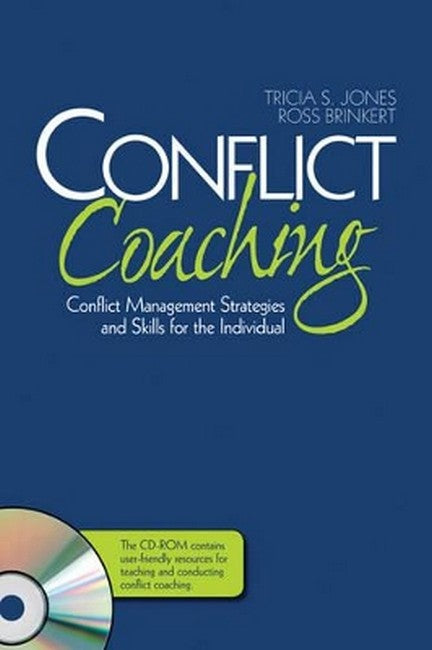I. Introducing Conflict Coaching 1. Conflict Coaching: Conflict Management Strategies and Skills for the Individual A General Definition of Conflict Coaching Sources of Development: An Overview of "Conflict" and "Coaching" in Likely Drivers of Continued Development for Conflict Coaching Conflict Coaching Principles Major Reasons for the Conflict Resolution Field to Develop Conflict Coaching 2. The Comprehensive Conflict Coaching Model An Overview of Coaching Models The Comprehensive Conflict Coaching (CCC) Model II. Conducting Conflict Coaching 3. Stage One - Discovering the Story Narrative Theory Narrative Theory Applied to Conflict Management Discovering the Story General Principles for Discovering the Story Specific Approaches for Discovering the Story 4. Stage Two - The Identity Perspective Identity in Relation to Emotion and Power Overview of Research and Theory on Identity A Model of Identity in Interpersonal Conflict in the Workplace 'Facework' as the Primary Means of Managing Identity General Principles for Identity Work with Conflict Coaching Clients Specific Approaches for Identity Work with Conflict Coaching Clients 5. The Emotion Perspective Introduction to Emotion Theories of Emotion Emotional Competence General Principles for Emotion Work with Conflict Coaching Clients Specific Approaches for Emotion Work with Conflict Coaching Clients 6. Stage Two - The Power Perspective Power in Relation to Identity and Emotion Overview of Research and Theory on Power Sources of Client Power in Conflict Power Patterns in Conflict Interaction Power Strategies and Tactics Power and Culture Working with Clients Who Feel and/or Act Disempowered General Principles for Power Work with Conflict Coaching Clients Specific Approaches for Power Work with Conflict Coaching Clients 7. Stage Three - Crafting the "Best" Story Relevant Change Theories The Link to Narrative Theory General Principles for Crafting the "Best" Story Specific Approaches for Crafting the "Best" Story 8. Stage Four - Communication Skills: Confrontation, Confirmation and Comprehension Culture and Communication Skills Key Conflict Communication Skills General Principles for Communication Skills Work with Conflict Coaching Clients General Approaches for Communication Skills Work with Conflict Coaching Clients Specific Approaches for Confrontation, Confirmation and Comprehension Work with Conflict Coaching Clients 9. Stage Four - The Conflict Styles Opportunity A Conflict Styles Framework Focusing on the Me, You and We of Conflict Styles Conflict Styles and Culture General Principles for Conflict Styles Work with Conflict Coaching Clients Specific Approaches to Conflict Styles Work with Conflict Coaching Clients 10. Stage Four - The Negotiation Opportunity Basics of Negotiation Two Major Approaches to Negotiation 11. Stage Four - Coordinating Coaching with Other Conflict Processes Organizational Dispute Systems The Role of Conflict Coaching in Leveraging Dispute Systems General Principles for Coordinating Conflict Coaching with Other Conflict Processes Specific Approaches for Coordinating Conflict Coaching with Other Conflict Processes 12. Learning Assessment in Conflict Coaching: The Parallel Process Learning Assessment: Did the Conflict Coaching Work? General Principles for Learning Assessment Specific Approaches to Learning Assessment III. Integrating Conflict Coaching Into Your Practice 13. Needs Assessment and Program Evaluation for Conflict Coaching Needs Assessment: Will Conflict Coaching Meet "My" Needs? Program Evaluation: Is Conflict Coaching Working for "You?" Using Needs Assessment and Program Evaluation to Market a Conflict Coaching Practice 14. The Future of Conflict Coaching A Research Agenda Training and Delivery Mechanisms Policy/Implementation Agenda
Request Academic Copy
Please copy the ISBN for submitting review copy form
Description
"In Conflict Coaching, Tricia S. Jones and Ross Brinkert have made a timely contribution to the advancement of the field of conflict analysis and dispute resolution. They simultaneously present a clear vision of the role of a conflict coach as well as a persuasive argument for a new and expanded mind set on who it is we say we are and what it is we say we do. The book makes credible arguments about the need for the conflict coach and then clearly blows open a much needed area of practice that has been unnecessarily restrained by outdated and untestable notions. The authors accomplish this by combining first rate scholarship with an easy to read guide on the practice of conflict coaching to create an evolutionary path within the field. From this book expect to see a flurry of other scholars and practitioners follow their lead in both print and practice." -Brian Polkinghorn, Ph.D. Distinguished Professor and Director Conflict Analysis and Dispute Resolution Wilson Elkins Professor, University System of Maryland Executive Director, Center for Conflict Resolution, Salisbury University -- Brian Polkinghorn, Ph.D. "Conflict Coaching is a book that should be in every corporate library and in every chief human resource officer's desk so others can see it! Moreover, this book should be provided for every young, high-potential corporate manager and be required reading in business school executive education programs." -- Frank P. Brennan, JE. "Jones and Brinkert offer example case studies illustrating the subject of each chapter, scholarly research throughout, a wonderfully approachable text and a companion CD of tools that makes a perfect addition to any Ombudsperson's library. Not only is this a terrific resource for us LTCOs, but also for Organizational Ombuds and other ADR professionals and practitioners seeking to clarify the whats and hows of empowering those we serve to better respond to the conflicts they face." -- Drew Strayer

